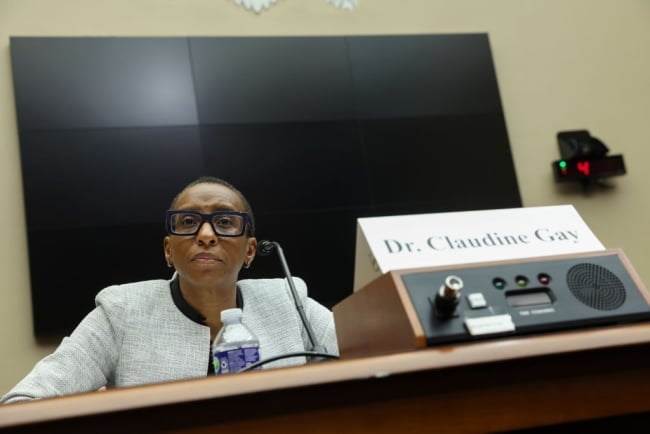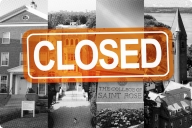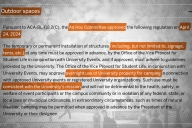You have /5 articles left.
Sign up for a free account or log in.

Harvard University president Claudine Gay announced her resignation Tuesday.
Kevin Dietsch/Getty Images
Updated 9:05 a.m., Dec. 12
The Harvard Corporation reaffirmed its support for President Claudine Gay in a statement released early Tuesday morning.
“Our extensive deliberations affirm our confidence that President Gay is the right leader to help our community heal and to address the very serious societal issues we are facing,” it read in part.
The board met Monday—in addition to a previously scheduled meeting Sunday—in an effort to contain the disastrous fallout of her testimony at last week’s congressional hearing on antisemitism in higher education.
Tuesday’s hearing, in which Gay, Massachusetts Institute of Technology president Sally Kornbluth and University of Pennsylvania president Elizabeth Magill drew widespread condemnation for equivocating on whether calls for genocide violated their campus policies, prompted Magill’s resignation Saturday.
But Gay clearly has more support. While some critics have called repeatedly for her ouster—a gesture that supporters say is connected to her status as the first Black person and second woman to hold the Harvard presidency—hundreds of professors have signed a letter of support, which they sent to the Harvard Corporation, one of the university’s governing boards.
“We, the undersigned faculty, urge you in the strongest possible terms to defend the independence of the university and to resist political pressures that are at odds with Harvard’s commitment to academic freedom, including calls for the removal of President Claudine Gay. The critical work of defending a culture of free inquiry in our diverse community cannot proceed if we let its shape be dictated by outside forces,” read the letter, which was obtained by Inside Higher Ed.
As of Monday afternoon, roughly 700 faculty members had signed the letter.
Harvard’s alumni have also signaled support. The Harvard Alumni Association Executive Committee sent a letter to the Harvard Corporation and the Board of Overseers on Monday, asking the two bodies to back Gay amid mounting criticism from outside groups.
“President Gay is the right leader to guide the University during this challenging time,” read the letter, obtained by CNN, in part. “She is thoughtful. She is kind. She is resolutely dedicated to the growth and wellbeing of our very diverse community. We recognize that there was disappointment in her testimony this past week. President Gay has pointed this out and apologized for any pain her testimony caused—a powerful demonstration of her integrity, determination, and courage.”
In a separate letter, a group of 1,100 “Concerned Black Alumni and Allies” offered “unequivocal support” for Gay “in her efforts to build a stronger, more inclusive community at our alma mater while balancing the critical principles of free thought and free speech.”
The letter acknowledged that during the antisemitism hearing, Gay’s compassion and concern were “lost in some of her carefully measured words.” But it also noted that Gay, the daughter of Haitian immigrants, is devoted to “fostering a community climate that does not tolerate harassment or bullying. While the current issues at play are complex, her commitment to fighting anti-Semitism, Islamophobia and racism has never wavered.”
Allegations of Plagiarism
Over the weekend, a new complication arose to test Gay’s hold on the presidency: allegations that she plagiarized part of her dissertation as a Harvard graduate student in the late 1990s.
The allegations of plagiarism first surfaced on social media Sunday night, when conservative activist Chris Rufo—most famous for his opposition to diversity, equity and inclusion programs and his role as a trustee at New College of Florida—announced in a post on X that he had “obtained documentation demonstrating that Harvard President Claudine Gay plagiarized multiple sections of her Ph.D. thesis, violating Harvard’s policies on academic integrity.”
Gay, a 1998 Ph.D. graduate who was awarded Harvard’s Toppan Prize for Best Dissertation in Political Science, has denied the accusations.
“I stand by the integrity of my scholarship. Throughout my career, I have worked to ensure my scholarship adheres to the highest academic standards,” Gay said in an emailed statement.
Rufo, in a series of posts, claimed that Gay lifted language “nearly verbatim” from various sources and passed it off as her own work, in violation of Harvard policies.
“These are flagrant violations of Harvard’s plagiarism policy, which states that students who commit plagiarism will suffer ‘disciplinary action, up to and including requirement to withdraw from the College.’ The same standard should apply to the university president,” Rufo wrote.
Harvard’s boards were silent on Monday, but on Tuesday the Harvard Corporation released a statement backing Gay and addressing the allegations of plagiarism.
“With regard to President Gay’s academic writings, the University became aware in late October of allegations regarding three articles. At President Gay’s request, the Fellows promptly initiated an independent review by distinguished political scientists and conducted a review of her published work. On December 9, the Fellows reviewed the results, which revealed a few instances of inadequate citation,” the board said.
The analysis determined that there was no violation of Harvard’s standards but noted, “President Gay is proactively requesting four corrections in two articles to insert citations and quotation marks that were omitted from the original publications.”
Gay’s thesis adviser, Gary King, who is also one of the academics that Rufo accused Gay of plagiarizing from, told The Daily Beast that Rufo’s allegations were “absurd” and “ridiculous” and that her dissertation “met the highest academic standards.”
Regardless of their validity, the plagiarism accusations may have increased pressure on Gay.
Critics, including 74 members of Congress and former president Donald Trump, have amplified calls for the ouster of all three presidents following last week’s House hearing. The college leaders were blasted for giving cautious, lawyerly answers to questions about antisemitism; none clearly stated that calls for the genocide of Jewish people would definitively violate institutional policies—though it’s not clear that such direct calls for genocide have been heard on any of their campuses.
Magill was already under pressure from donors over a Palestinian literary festival held at Penn when she resigned Saturday. Kornbluth, by contrast, was given a vote of confidence by MIT’s governing board last week.
Gay’s job also appears secure for now.
Outside Reactions
Outside Harvard, debate is swirling around the plagiarism allegations—especially in conservative circles.
Some scholars have questioned whether what Gay is accused of rises to the level of plagiarism, while others—assuming that Rufo’s information is accurate—have suggested there is no question that Gay improperly lifted material without proper attribution and passed it off as her own work.
Many academics have downplayed Rufo’s claims, suggesting they are exaggerated, that he fails to understand academic research citation standards and that he is grasping at technicalities in an effort to take down Harvard’s president.
Carol Swain, a retired academic and one of the authors Gay is accused of plagiarizing, has also weighed in. While she did not directly accuse the Harvard president of plagiarism, Swain criticized her scholarship, writing on X that she had failed to properly cite Swain’s 1993 book, Black Faces, Black Interests: The Representation of African Americans in Congress.
In an interview with Rufo, she said “at best, it was sloppiness.” A conservative Black woman who has written at length about the intersection of race and politics, Swain said that Gay's “whole research agenda, her whole career, was based on my work.” She added that Gay would be fired if she were a white man dealing with the same controversy at Harvard.
Other academics have defended Gay’s scholarship.
Paula McClain, a political science professor at Duke University and former president of the American Political Science Association, told Inside Higher Ed by email that Gay “is highly respected within the discipline of political science” and “a careful, innovative and creative scholar” who has been published in major disciplinary journals.
Morehouse College president David Thomas also defended Gay and her legitimacy as Harvard’s president, which he said is being questioned because she is a Black woman.
“I feel compelled to call attention to the predictable dynamic that the legitimate concerns about antisemitism on university and college campuses will be [hijacked] by those with an agenda to undermine black and female leaders in elite institutions whose leadership for centuries has been the almost exclusive province of white men,” Thomas, a former Harvard professor, wrote on LinkedIn Monday. He added that antisemitism is being used “as a wedge to divide us by those fearful of an emerging leadership of American institutions that reflects our diversity.”
Various others also questioned Rufo’s motivation and credibility.
“No serious person should take a damn thing Chief Propagandist Rufo says [seriously]. He’s an expert at lying about and smearing people who dare disagree with his worldview,” Issac Bailey, a communication studies professor at Davidson College, wrote in a post on X. In a separate post, Bailey referred to the plagiarism accusations as “a ridiculous charge made up by a charlatan.”
Rufo, for his part, has acknowledged in online posts that he “sat on the Claudine Gay plagiarism materials for the past week, waiting for the precise moment of maximum impact.”
With Harvard’s boards scheduled to meet, Rufo posted the allegations online.
“We scrambled to get it out while the moment was right,” Rufo wrote Sunday night.
Now, as Rufo and numerous other conservatives hope for Gay’s resignation or firing, free speech advocates are warning of the dangers of allowing outside influence to drive decisions by governing boards, including who should lead universities through moments of serious conflict.
(This is a developing story.)








